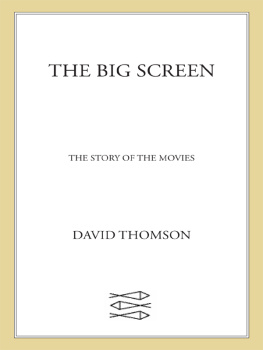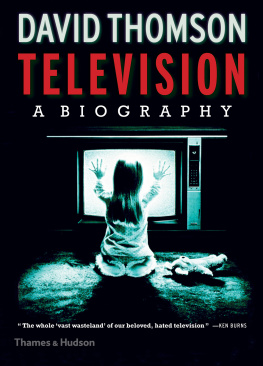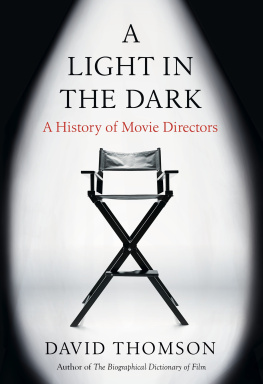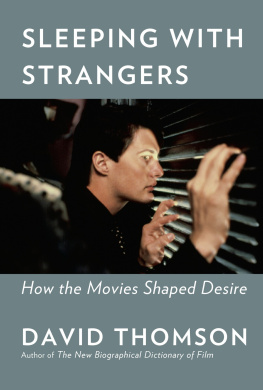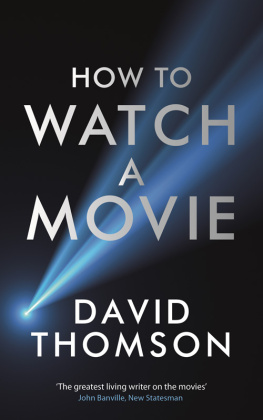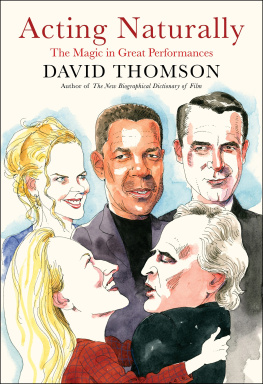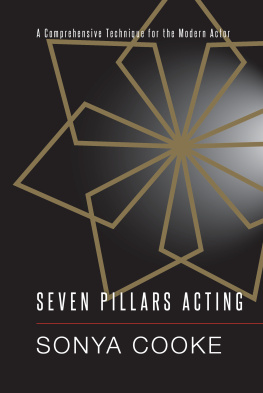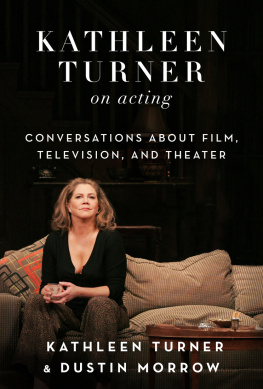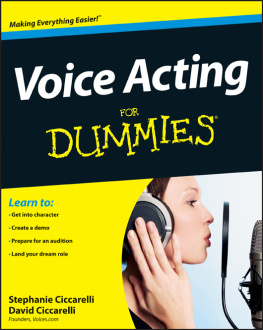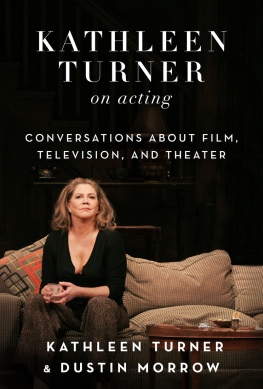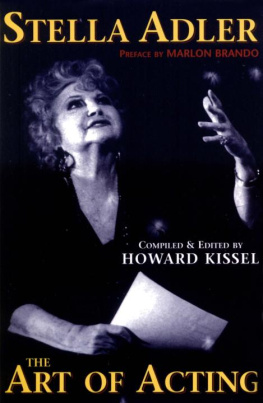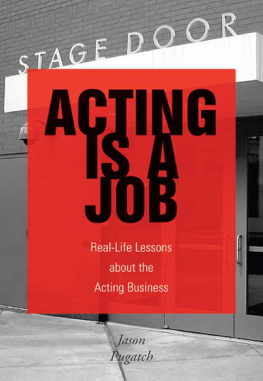why acting matters
David Thomson
Why Acting Matters

Why X Matters and the yX logo are registered trademarks of Yale University. Copyright 2015 by David Thomson. All rights reserved. This book may not be reproduced, in whole or in part, including illustrations, in any form (beyond that copying permitted by Sections 107 and 108 of the U.S. Copyright Law and except by reviewers for the public press), without written permission from the publishers. | Published with assistance from the foundation established in memory of Henry Weldon Barnes of the Class of 1882, Yale College. Yale University Press books may be purchased in quantity for educational, business, or promotional use. For information, please e-mail (U.K. office). Set in Times Roman and Adobe Garamond types by Integrated Publishing Solutions. Printed in the United States of America. Library of Congress Cataloging-in-Publication Data Thomson, David, 1941. Why acting matters / David Thomson. pages cm(Why X matters) Includes bibliographical references. ISBN 978-0-300-19578-1 (cloth : alk. paper) 1. Acting. I. Title. PN2061.T525 2015 792.028dc23 2014029867 |
A catalogue record for this book is available from the British Library. |
This paper meets the requirements of ANSI/NISO Z39.48-1992 (Permanence of Paper). |
10 9 8 7 6 5 4 3 2 1 |
Also by David Thomson
The New Biographical Dictionary of Film (sixth edition, 2014; first edition, as A Biographical Dictionary of Film, 1975)
Moments That Made the Movies (2013)
The Big Screen: The Story of the Movies (2012)
Try to Tell the Story: A Memoir (2009)
The Moment of Psycho: How Alfred Hitchcock Taught America to Love Murder (2009)
Have You Seen ?: A Personal Introduction to 1,000 Films (2008)
Nicole Kidman (2006)
The Whole Equation: A History of Hollywood (2004)
In Nevada: The Land, The People, God, and Chance (2001)
Beneath Mulholland: Thoughts on Hollywood and Its Ghosts (1998)
Rosebud: The Story of Orson Welles (1997)
42 (1996)
Showman: The Life of David O. Selznick (1993)
Silver Light (1990)
Warren Beatty and Desert Eyes: A Life and a Story (1987)
Suspects (1985)
America in the Dark: Hollywood and the Gift of Unreality (1978)
Wild Excursions: The Life and Fiction of Laurence Sterne (1972)
Hungry as Hunters (1972)
A Bowl of Eggs (1970)
Movie Man (1967)
For Justin, Heather, Carmine, Julia, and Jim
Scratch an actor, said Laurence Olivier, and you find an actor. He should have known, but I dont think its true, or any more true of actors than politicians, or priests, or teachers, or strippers, or anyone else engaged in acts of public self-display. What is true, I think, is that if you scratch an actor you will find a child. Not that actors are inherently less mature than politicians, priests, etc., but actors must retain a childs appetite for mimicry, for demanding attention, and above all for playing. They must see with a childs heart, innocent of judgement.
RICHARD EYRE, Utopia and Other Places
They were waiting to go on, and I heard them say: Where did you have lunch today, old boy?Oh, Rules. Where did you?The Savoy Grill. What did you have?The rognons de veau was superb.And claret? Yes, a great glass of claret. I like that, because theres so much bullshit about preparing for your part. These were actors who just knew that when you got on the stage, you acted. When it started, and not before.
HAROLD PINTER, observing John Gielgud and Ralph Richardson in his play No Mans Land
contents
ACT I
Towards the End of the Day
Fade in on a painted theatre curtain, dirty, worn and ragged. Silence.
No music. Then knocks and banging can be heard in the wings.
I begin with what is called a stage direction, in which the theatre itself seems to be the play. But it also feels like indications from a film script; its on screen that images fade in and out, as slippery as transformation or instability. On stage, appearance is a steadier, dogged presence, appealing at first, but soon helpless or static. Unless the sense of place and dcor is elastic, soaring, and in the mind. But saying that leads us to theory and the argument of this extended essay:
For whereas we feel a first thrill when the opening curtain reveals a staged place, or when reality dawns on a screen, still we can hardly embark on a study of acting without acknowledging that its attempt at realism or actuality is forlorn and self-defeating. Acting is an escape from reality, as well as an exultation or despair over it. I warn you that the more strenuously real a play or a movie claims to be, the quicker I become bored. The only honorable reality is that of pretending, but that is sufficient reason why acting matters beyond all differences in style, pay grade, or how good the process is.
We like to propose that some acting is better than others: so Brando, Olivier, or Day-Lewis (recurring figures in this book) are superior to your Uncle Arthur, the Christmas bore when he does his bits of Shakespeare, or vaudeville. But the same connoisseur cavils over the masters: so Olivier was too cold, Brando gave up his calling, and Day-Lewis gets lost in his roles. Sometimes he was Hamlet for days at a time until he suffered the princes breakdown. But Arthur labors on with his art and his life year after year without pay or reviews. He may know he is not very good or convincing; that hardly matters; no one does his part the way he does it.
We might as well start by admitting that all acting is bad as much as it is good: it could be improved; it is immoral and distracting in that it puts the humbug of ultimate Truth above tedious daily honesty, or the attempt at it; and it is dangerous in that it allows us to give up on to thine own self be true, while trying to be anyone and everyone. Acting is so essential or inescapable that it easily absorbs and welcomes bad acting. So let us toss out that old chestnut that the play or the actor may help us to live better. There is no help. The purpose of acting is to evade such considerationsand you can see how fruitful it has been.
The enthusiasm for acting that has intensified in the past five hundred years, or two thousand, whichever size blink you prefer, has come about because we have been drawn to pretense or avoidance beyond any hope for reality. As a rule, we make a mess of reality, whether it is our own and Uncle Arthurs lives or the Fate of the Earth. As it becomes clearer that the evolution of weather may overwhelm us, drown us, dry us out like bones in the desert, so we love the fertile fictional places more and moreShakespeares Arden, Becketts desolate country road, John Fords Monument Valley, or the Paris of the French New Wave. Acting and the space in which acting occurs matter because they are the material of a ritual to be beheld while we give up our ghost. This evasion or experiment can exist on stage or screen, at the opera, at the ballet, or at a soccer match where a player tries to be himself, or even when a tipsy Uncle Arthur strives to say what life is about. Only the passage of time has to be filled, and when we are fearful of our time being suddenly stopped, we love the dream that we can control it by taking creative charge and replacing uncertainty with performance.
Next page

